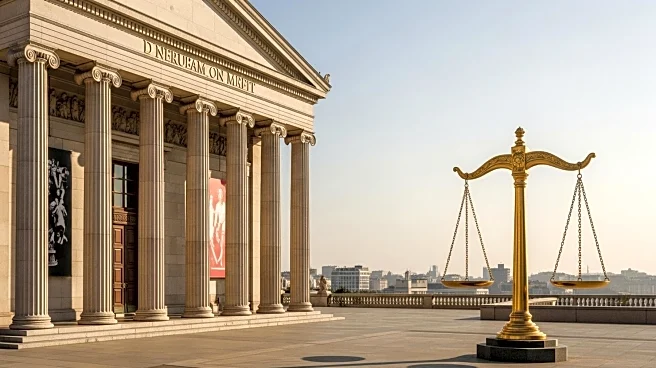What is the story about?
What's Happening?
Glenn Lowry, the former director of the Museum of Modern Art (MoMA) in New York, has expressed concerns about the potential loss of tax-exempt status for non-profit museums in the United States. Speaking on a podcast, Lowry highlighted the importance of the 501(c)3 status, which exempts museums from federal taxes if they operate for charitable or educational purposes. He warned that the Trump administration might seek to revoke this status, which could significantly impact the cultural landscape in the U.S. This concern follows a bill passed by the U.S. House of Representatives that would give the Treasury Secretary the power to revoke non-profit status, although the bill has stalled in the Senate. Lowry's comments come amid a backdrop of political and social changes affecting museums, including decreased visitor numbers and the need for museums to navigate complex political landscapes.
Why It's Important?
The potential revocation of tax-exempt status for non-profit museums could have far-reaching implications for the cultural sector in the United States. Museums rely on this status to operate without the burden of federal taxes, allowing them to focus on educational and charitable missions. Losing this status could lead to financial strain, reduced programming, and a diminished ability to serve the public. This issue is particularly pressing as museums face challenges such as declining visitor numbers and the need to address social and political issues. The outcome of this situation could affect not only the financial health of museums but also their role in society as spaces for cultural exchange and education.
What's Next?
The future of the 501(c)3 status for museums remains uncertain, with the bill to revoke it stalled in the Senate. Museum leaders and organizations are likely to continue advocating for the preservation of this status, emphasizing its importance for the cultural sector. As political dynamics evolve, museums may need to adapt their strategies to ensure their sustainability and relevance. The broader cultural community will be watching closely to see how this issue develops and what steps are taken to protect the interests of non-profit museums.
Beyond the Headlines
The potential changes to the tax-exempt status of museums raise broader questions about the role of cultural institutions in society and their relationship with government policies. Museums may need to explore new funding models and partnerships to maintain their operations and continue serving the public. Additionally, this situation highlights the importance of advocacy and engagement with policymakers to ensure that the cultural sector's needs are considered in legislative decisions.















